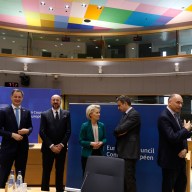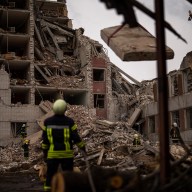By Alissa de Carbonnel and Vladimir Soldatkin
BRUSSELS/MOSCOW (Reuters) – Declarations by Russia and Turkey last week reviving plans for the TurkStream natural gas pipeline linking the two have worried EU diplomats who see it strengthening Moscow’s hand – but analysts say the project is more rhetoric than reality. EU officials fear that TurkStream will be expanded to bypass Ukraine as a transit route for supplies to Europe, increasing dependence on Russian gas export monopoly Gazprom and shutting in alternative supplies from the Caspian region. “Turkey’s new friendship with Russia might become an issue if Russia tries to replace Turkey for Ukraine,” a senior EU official said. “It makes sense for Turkey to get cheap gas from Russia, but it will come with strings attached: That is likely to be a problem for us.” However, the entente, almost a year after Turkey’s downing of a Russian warplane, remains fragile, analysts say, particularly amid turmoil caused by the failed coup in Turkey. “In times of instability, if you are sane, you don’t commit to huge infrastructure projects,” said Simone Tagliapietra, an energy fellow with Brussels-based think tank Bruegel. Moscow and Ankara are more keen on “signaling political messages than about advancing projects in reality,” he said. Russia’s drive to reroute gas to Europe around Ukraine, including by expanding the Nord Stream pipeline to Germany, has met with heated opposition in Brussels since Moscow annexed Ukraine’s Crimea region in March 2014, prompting EU sanctions. Turkey’s own role in facing off with Russia and as an energy corridor has tempered EU criticism of President Tayyip Erdogan authoritarian turn. EU officials will be watching warily as Erdogan and his Russian counterpart Vladimir Putin are set to agree a deal on TurkStream next month at their first meeting since Russia imposed sanctions over Turkey’s shooting down of the jet near the Syrian border last November. For now, Russia is planning construction of two out of an initial four projected pipelines. Capacity of one line is around15.75 billion cubic metres of gas per year. That would mean retaining gas flows via Ukraine – albeit reduced – after Moscow’s transit contract with Kiev expires in 2019. Ukraine plans to ship around 72 bcm of Russian gas in 2016 – more than 40 percent of Russia’s gas supplies to Europe. Part of the line would lay along the same route as Russia’s canceled South Stream pipeline, which ran up against EU opposition on competition grounds in late 2014. TurkStream follows a different logic, delivering gas only to the EU’s border to avoid falling foul of EU rules.
NO MORE THAN ONE STRING
Russian Energy Minister Alexander Novak said on Friday Turkey will “play a large role as a transit country” to supply Europe – the very prospect which worries EU officials.
Brussels is instead promoting a chain of pipelines known as the Southern Gas Corridor to transport gas from the Shah Deniz field in Azerbaijan to European markets by 2020.
“We follow the developments in Turkey closely,” European Commission Vice-President Maros Sefcovic said in an email to Reuters. “Turkey is fully aware of its responsibility as a key country for the implementation of the Southern Gas Corridor.” Shaky Russian-Turkish ties are just one reason analysts are sceptical TurkStream will be built to its full, 63 bcm capacity.
“I don’t believe Russia wants to replace a problematic Ukrainian relationship with a problematic Turkish one,” said Katja Yafimava of the Oxford Institute for Energy Studies.
Turkey, Russia’s second-largest gas market after Germany, has its own worries about being too reliant on Russian gas. TurkStream also competes with Russia’s own plans to double capacity along the Nord Stream route to Germany, with European demand too weak to justify both projects, experts say. “Turkish Stream will give way,” said Sijbren de Jong, an analyst with the Hague Centre for Strategic Studies. “It is highly unlikely that the pipeline will extend into Southeastern Europe.” (Additional reporting by Robin Emmot in Brussels and Nina Chestney in London; Writing by Alissa de Carbonnel, editing by William Hardy)
















